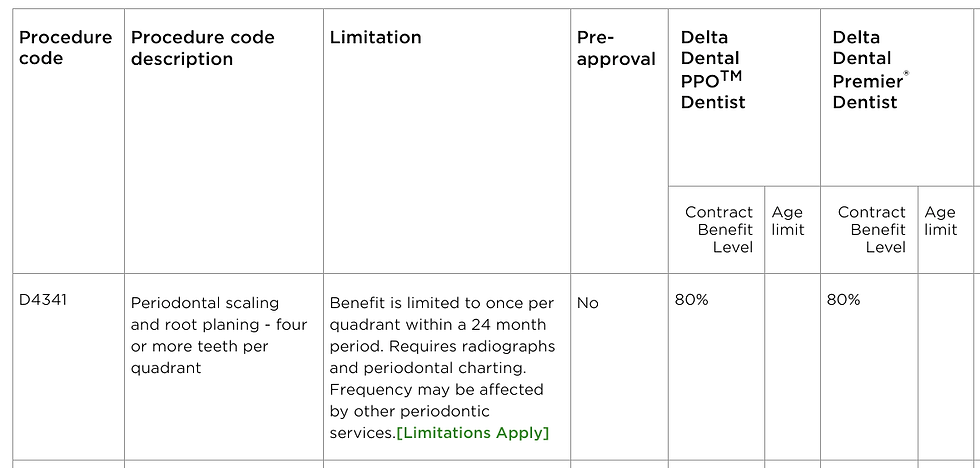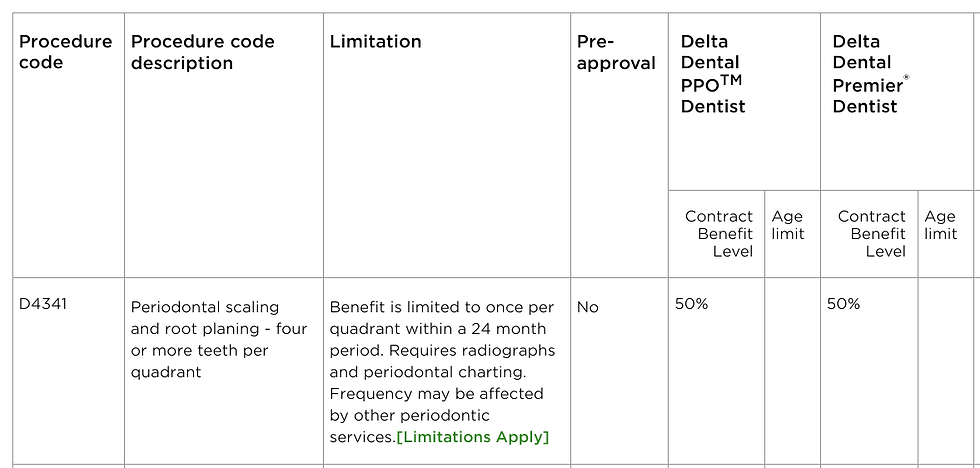Does Delta Dental Cover Deep Cleanings?
- David Chen, DDS

- Dec 8, 2023
- 4 min read
Updated: Dec 10, 2023
On average, delta dental will cover deep cleanings at 80% but only if you meet their eligibility requirements. If delta determines that your gum condition does not meet their criteria, you will not get coverage for it.

In other words, you will get no insurance benefit and you'll be responsible for paying all of it out of pocket. Aside from that, there is also a frequency limitation that may preclude you from getting benefits even if your periodontal condition does qualify.
Note: These are estimates, if you want to know the exact cost, ask your dentist to send out a pre-approval. You'll receive a letter in the mail with a breakdown of the exact costs.
Table of contents:
Coverage for deep cleaning
On average, the coverage for a deep cleaning with delta dental insurance is about 80% which means you'll have a 20% copayment. That means you're responsible for 20% of the scaling and root planing treatment cost which you'll be paying out of pocket.
Below is an example of a benefits breakdown of one of our patients. It shows 80% coverage which is what we see on average with delta plans.

However, that doesn't mean that you can't have more or less coverage for this treatment with delta. We have seen some of our patients with plans that do have higher coverage and also lower coverage as well. It all comes down to the specific plan that you purchased and signed up for.
Higher coverage example
To prove our point, below is an example of one of our patients who has higher than average coverage. They have 90% coverage for it which is great!

Lower coverage example
On the opposite end of the spectrum, below is an example of one of our patients who has lower than average coverage. They only have 50% coverage, which means they'll have a larger copay than the previous examples.

Cost for deep cleaning
The estimated average cost of a deep teeth cleaning with delta dental is $200 and that is if you have 80% coverage for periodontal treatments. That amount includes the cost for all four quadrants of your mouth (upper left, lower left, upper right, lower right).
Yes, the entire treatment is billed out to insurance based on quadrants so you should expect to see the code appear four times on the explanation of benefits. The dental code for each quadrant is D4341.
Eligibility criteria
Your insurance plan may say that you have X% amount of coverage for scaling and root planing but if you don't meet delta dental's criteria, it will not be covered. Essentially you may be denied benefits for it if your insurance deems that you don't need the procedure.
Eligibility requirements:
Bone loss on x-rays. Presence of bone loss on dental radiographs are indicative of periodontitis. No bone loss would indicate gingivitis which would preclude you from benefits.
Large calculus present on x-rays. A lot of tartar that can be seen on the x-ray is a sign that you need the teeth cleaned deeper and the roots planed.
Unfortunate situations
Sometimes we get patients who do have a lot of tartar build up and bleed a mouth full of blood during the procedure but the x-rays don't show their condition properly. Due to this, sometimes they may get denied benefits for the treatment because the x-ray doesn't show it.
What often happens is you'll get the claim back and the EOB says that it was denied. How could that be because you were practically spitting out blood all over the cuspidor during the appointment.
What we've found helpful is sending the vibrantly red after photos of your treatment to delta dental. That typically increases the approval rate!
Frequency limitations
Most dental insurances including delta dental have a frequency limitation on periodontal procedures such as deep cleanings (Scaling and Root Planing). Most commonly, we've seen a two year frequency limitation with scaling and root planings (SRP).
Below is an example of a frequency limitation for this procedure. Delta highlighted the link in GREEN, "limitations apply."

That means you can only get SRP every 2 years. If you try to do it more than that, delta will deny you coverage and benefits. That means you will need to pay for the entire treatment out of pocket.
The implication is that after you get the treatment done the first time, you should try your best to keep your gums healthy. As long as they stay healthy and you don't develop a lot of calculus build up, you won't need to get the treatment done again. Only those who are non-compliant and don't stay on top of their oral hygiene, will regress and require the teeth to be cleaned more deeply again.
What else to keep in mind
After a deep cleaning, you will no longer be getting regular teeth cleanings because all of your subsequent visits will be classified as a periodontal maintenance instead.
Your dentist and your insurance company, may re-code your dental cleaning (D1110) as perio maintenance (D4910) in order to identify you as a perio patient. That means once you've succumbed to periodontal disease once before, you will be tagged with it for life.
The significance of getting perio maintenance instead of an adult prophy is that you may have a different copay.
Typically the prophylaxis D1110 is in the preventative category and is usually covered at 100% by delta dental.
The perio maintenance D4910 is in the periodontal category and is usually covered at 80% by delta.
In other words, you should expect an additional copay for all subsequent dental cleaning appointments once you've received a deep cleaning!
Takeaway
Yes, delta dental insurance can cover a deep cleaning if you're eligible.
Key points:
The average coverage is 80% with a 20% copay.
The average cost is $200 with 80% coverage.
You need to have radiographic bone loss or calculus build up to be eligible.
You must not have had it done within the last 2 years.
As long as you fulfill all of the conditions above, you will get your insurance benefit for your much needed gum treatment. Our dentists in long island city are in network with delta dental so if you're in the area, come make an appointment.



